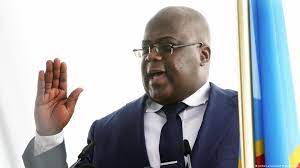APA-Kinshasa (RD Congo) – Felix Tshisekedi, in power since January 2019, was re-elected in the first round of the presidential election on 20 December.
More than four months after Félix Tshisekedi’s re-election to the presidency and one month after the appointment of a prime minister, the new government in the Democratic Republic of Congo has been slow to be formed, while the country faces a serious security crisis in the east.
These delays, although common in a country with complex regional balances and accustomed to lengthy political negotiations, are raising expectations because of the clear victory of Felix Tshisekedi and the
urgent challenges to be met, according to political scientist Christian Moleka quoted by AFP.
“For many citizens, the formation of the government is perceived as a sharing of power between politicians, often to the detriment of the concerns of the population,” explains Brandon, a 33-year-old civil servant we met in Kinshasa.
In power since January 2019, Felix Tshisekedi was re-elected in the first round of the presidential election on 20 December, with a large majority, and his “Sacred Union” won almost 90 percent of the seats in
the national parliament in the legislative elections held on the same day.
Officially sworn in for a new five-year term on 20 January, the President accepted the resignation of Prime Minister Sama Lukonde on 21 February and entrusted day-to-day management to the outgoing team.
On 1 April, Judith Suminwa Tuluka was appointed Prime Minister, becoming the first woman to hold the post in the DRC. Since then, she has been holding consultations, while discussions continue in
parliament to appoint the President of the National Assembly.
Despite its large majority, the Union Sacrée is described as a complex and fragmented entity, with more than 900 political parties in Congo, according to Christian Moleka. Vital Kamerhe, a former economy
minister, has been chosen as the majority candidate for the presidency of the National Assembly.
Meanwhile, the east of the DRC continues to face violence perpetrated by various armed groups, including the M23 rebellion, with the alleged support of neighbouring Rwanda, which occupies vast territories in North Kivu province, exacerbating the security crisis.
AC/fss/APA/AFP


